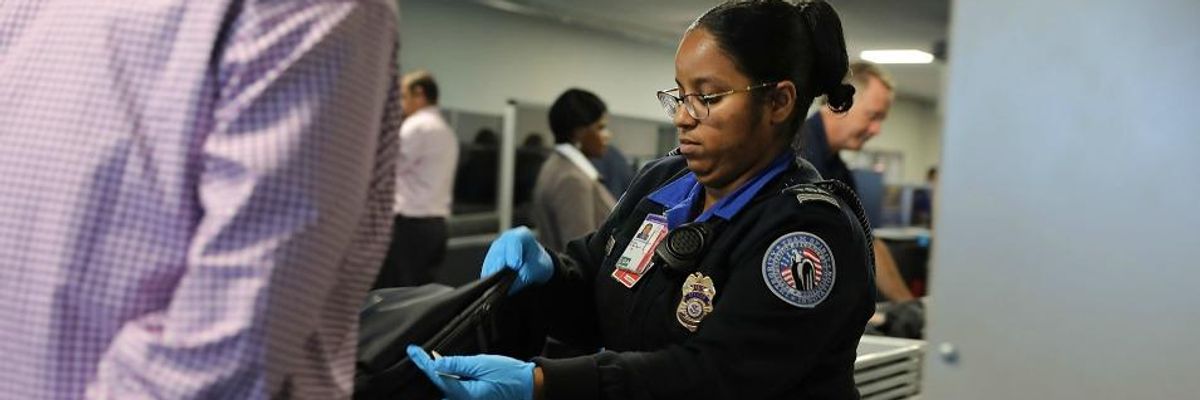When President Joe Biden ran for office in 2020, he promised the American Muslim community that he would respond to their concerns about the harmful impact of the federal terrorism watchlist and the no-fly list by reviewing both databases and changing the processes to remove names.
Three years later, nothing has been done. And American Muslims are suffering the consequences.
On May 1, the Secret Service banned America’s longest-serving Muslim mayor from attending the White House’s annual Eid al-Fitr celebration.
Driving southbound on I-95, Prospect Park, N.J. mayor of 17-years Mohammed Khairullah received a phone call from White House staff unceremoniously explaining to him that they were disinviting him from the Eid event because the Secret Service did not grant him the necessary security clearance. There was no apology or further explanation.
After interviewing Mayor Khairullah, lawyers at the Council on American-Islamic Relations' Legal Defense Fund were able to confirm that the FBI assigned the mayor—who has never been accused of any wrongdoing or crime—a status on the watchlist several years ago.
The so-called terrorist watchlist is essentially a list of Muslim names.
Because historic watchlist information is used to screen visitors to the White House, Mayor Khairullah was denied entry to the White House.
Created by the Bush administration in the aftermath of September 11, the watchlist—then officially the “Terrorist Screening Database,” now the “Terrorist Screening Dataset”—is a list of more than a 1.5 million names of people known or suspected to be terrorists maintained by an organization the FBI made up, called the TSC, though the FBI cannot decide if that is short for “Terrorist Screening Center” or “Threat Screening Center.”
The men and women on the list are all accused by the government of being “reasonably suspected” of having some association with terrorism, but there are no meaningful standards for what qualifies.
The government admits that race, religion, national origin, travel, and studying theology or languages all can be considered in deciding whether someone should be on the list. You do not need to be suspected of any criminal activity to be put on the list. And a variety of federal agencies and even foreign countries can nominate people to the list, with the TSC accepting over 99% of all nominations.
Thanks to a recent leak of a 2019 version of part of the list to a Swiss hacker, we now also know what everyone has long suspected—that the so-called terrorist watchlist is essentially a list of Muslim names.
CAIR had statistical experts perform a study of the leaked names on the list, and that study concluded that over 98% of the people on the list are Muslim. In contrast, government reports make clear that the largest terrorist threat to the United States comes from white supremacists.
Life for the Muslims on the list is a nightmare. Those on the list cannot fly without coming to the airport, waiting potentially hours to be cleared by desk agents to fly, and then going through invasive secondary screening.
When coming back from the country, those on the list are detained by border agents, sometimes at gunpoint in front of friends and family. They sit in holding cells for hours, interrogated, their electronics searched, and sometimes not returned for weeks or ever. At least one individual has been hospitalized in the process.
Those on the watchlist have missed weddings, funerals, and even the birth of their children. They have lost their jobs. Some have stopped traveling by air. Some refuse to leave the country. Some have just moved away from the United States entirely.
Some people on the watchlist are designated for the infamous “No Fly List,” which means they cannot fly at all inside, to, from, or even over the United States.
One of CAIR's clients on the No Fly List had to spend six days traveling from the Midwest to South Asia, through Mexico, South America, and the Middle East, to see the birth of his son—all part of a dramatic effort to outrun the travel restrictions placed on him.
And travel is not the only harm. Saadiq Long, an Air Force veteran in Oklahoma City, for months was randomly stopped by police in his hometown—including at gunpoint—because every time he drove past an automated license plate reader, the reader told police that a terrorist was in the car.
Over 20 years of experience makes clear that the best way to meaningfully improve the terrorist watchlist is to end it.
Other people on the watchlist have had trouble getting immigration status for family, have had bank accounts closed, or were unable to get work-related clearances and licenses.
This whole nightmare of a list might be defensible if it made us safer, but it doesn’t. The government has not shown that any terrorist attack was stopped because of the watchlist.
The closest thing to any domestic terrorist attack committed by someone on the watchlist was a teenager who attempted to attack three police officers. Other than that, CAIR is not aware of anyone charged for engaging in terrorist-related activity while on the watchlist. The government’s experiment in pre-crime has failed.
So why does the watchlist persist? Some of it may be inertia, with nobody wanting to get rid of even a completely unhelpful list. Some of it is that the list remains valuable as an excuse to collect data from Americans at the border, and for the FBI to use as leverage to get individuals to spy on local mosques for them. Whatever the reasons, it is not to protect America.
President Biden should fulfill his campaign promise. And over 20 years of experience makes clear that the best way to meaningfully improve the terrorist watchlist is to end it.
American Muslims, including one of the community's most prominent political leaders, have suffered enough.

